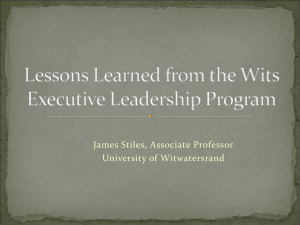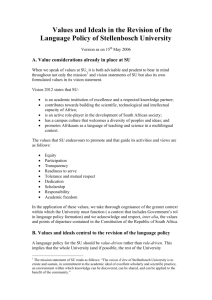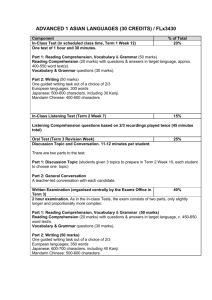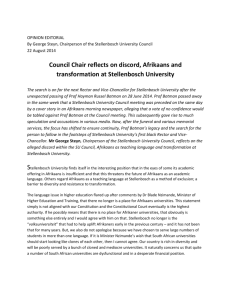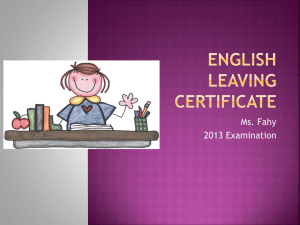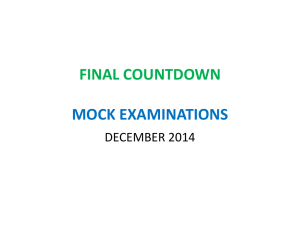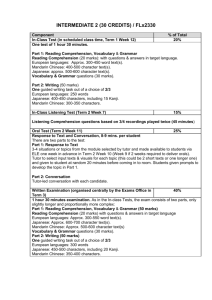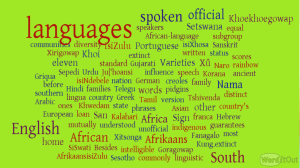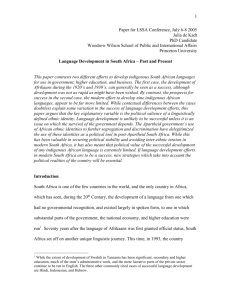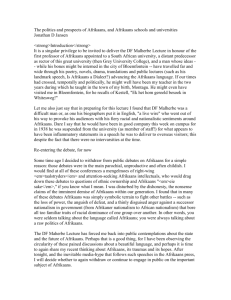Afrikaans in Chesterhouse
advertisement
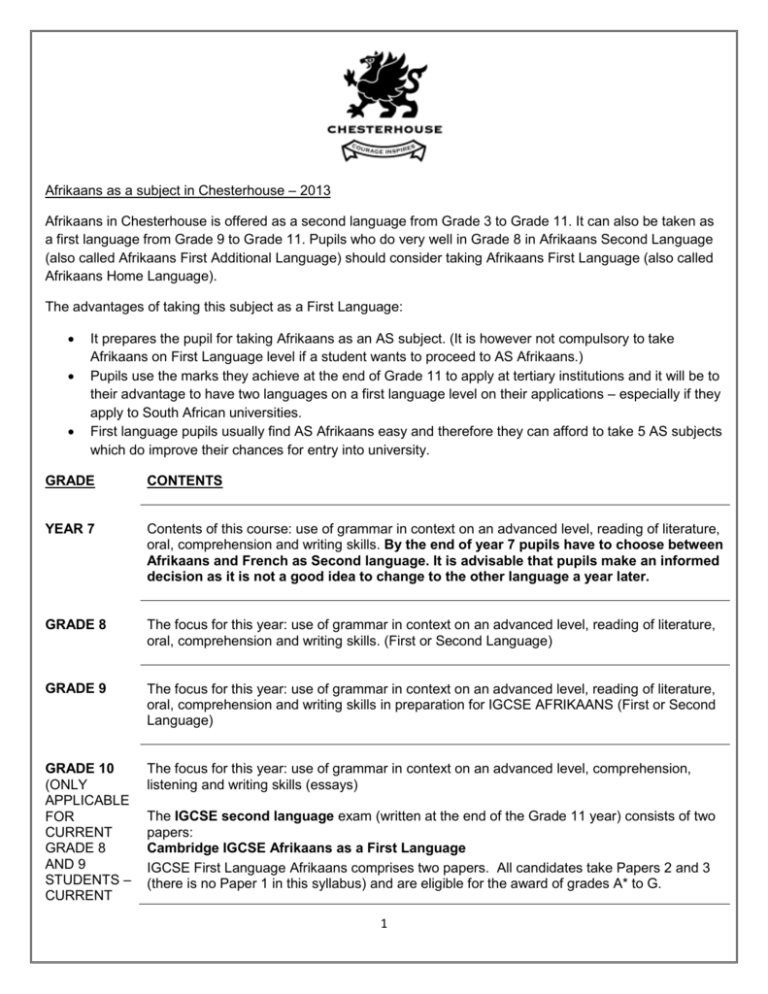
Afrikaans as a subject in Chesterhouse – 2013 Afrikaans in Chesterhouse is offered as a second language from Grade 3 to Grade 11. It can also be taken as a first language from Grade 9 to Grade 11. Pupils who do very well in Grade 8 in Afrikaans Second Language (also called Afrikaans First Additional Language) should consider taking Afrikaans First Language (also called Afrikaans Home Language). The advantages of taking this subject as a First Language: It prepares the pupil for taking Afrikaans as an AS subject. (It is however not compulsory to take Afrikaans on First Language level if a student wants to proceed to AS Afrikaans.) Pupils use the marks they achieve at the end of Grade 11 to apply at tertiary institutions and it will be to their advantage to have two languages on a first language level on their applications – especially if they apply to South African universities. First language pupils usually find AS Afrikaans easy and therefore they can afford to take 5 AS subjects which do improve their chances for entry into university. GRADE CONTENTS YEAR 7 Contents of this course: use of grammar in context on an advanced level, reading of literature, oral, comprehension and writing skills. By the end of year 7 pupils have to choose between Afrikaans and French as Second language. It is advisable that pupils make an informed decision as it is not a good idea to change to the other language a year later. GRADE 8 The focus for this year: use of grammar in context on an advanced level, reading of literature, oral, comprehension and writing skills. (First or Second Language) GRADE 9 The focus for this year: use of grammar in context on an advanced level, reading of literature, oral, comprehension and writing skills in preparation for IGCSE AFRIKAANS (First or Second Language) GRADE 10 (ONLY APPLICABLE FOR CURRENT GRADE 8 AND 9 STUDENTS – CURRENT The focus for this year: use of grammar in context on an advanced level, comprehension, listening and writing skills (essays) The IGCSE second language exam (written at the end of the Grade 11 year) consists of two papers: Cambridge IGCSE Afrikaans as a First Language IGCSE First Language Afrikaans comprises two papers. All candidates take Papers 2 and 3 (there is no Paper 1 in this syllabus) and are eligible for the award of grades A* to G. 1 GRADE 10 AND 11 STUDENTS WILL WRITE THIS EXAM IN NOVEMBER OF GRADE 11) Paper 2 (Weighting: 70%) Part 1 – 30 marks Question 1 – 10 marks Candidates answer a series of questions based on Passage 1. Question 2 – 20 marks Candidates respond to a directed writing task based on their understanding of Passage 1. Part 2 – 40 marks Candidates select, compare and summarise specific information from both passages. Question 4 – 20 marks Candidates make a critical interpretation, a considered judgement or a personal response to Passage 2. 1 hour 45 minutes Paper 3 (Weighting: 30%) Candidates write one composition of 350–500 words. 1 hour 30 minutes Cambridge IGCSE Afrikaans as a Second Language The syllabus assesses candidates’ ability to use Afrikaans as a medium of practical communication, and is aimed at students for whom Afrikaans is not a first language/mother tongue but for whom it is a lingua franca or language of study. All candidates take Papers 1 and 2, and are eligible for the award of grades A* to G Duration Weighting Reading and Writing (Weighting: 70%) There are seven exercises testing reading, information transfer, note-making, summary writing and continuous writing. 2 hours Listening (Weighting: 30%) There are four exercises: one true/false, one multiple choice and two comprehension exercises. Approximately 35-45 minutes GRADE 11 (ONLY APPLICABLE FOR CURRENT GRADE 8 AND 9 STUDENTS – CURRENT GRADE 10 AND 11 STUDENTS WILL WRITE THIS EXAM IN The focus for this year: use of grammar in context on an advanced level, reading of literature, discussion of newspaper and magazine articles on relevant topics, comprehension and writing skills (essays) Afrikaans as an AS Level subject will be taken on Second language level (thus no literature). The AS Second Language exam consists of two papers: Paper 1: Reading and Writing (1h45mins.) – consists of two comprehensions and longer questions Two passages in the target language are set which deal with related themes. Candidates answer specific and general comprehension questions on the two passages, and respond to a task requiring a summary or comparison of issues raised. The target language will be used for all questions and answers. The passages will have been written during the last 2 NOVEMBER OF GRADE 12) twenty years, and will reflect the international scene. In addition: • the two passages, taken together, will not exceed 750 words • on the first passage, two tests (5 marks each) will cover vocabulary recognition and grammatical manipulation. These will be followed by a series of comprehension questions (15 marks for content and 5 marks for quality of language) • on the second passage, there will be a series of comprehension questions (15 marks for content and 5 marks for quality of language) • the last question will require candidates to write about 140 words, drawing information from both passages and adding their own opinions, (10 marks for information drawn from the passages, 5 marks for personal response to the material, and 5 marks for quality of language). Paper 2: Essays (1h30mins.) – consists of an essay of 250 to 400 words. A list of five topics, selected from the topic areas in Section 4, is published annually in the syllabus, and changes every year. A question will be set on each of the five topics; candidates choose one question and write an essay in the target language of 250–400 words. Of the 40 marks available, 24 are for the quality of the language and 16 for the content. Set topics for 2013: 1 Food and drink 2 The developing world 3 Travel and tourism 4 Generation gap 5 Equality of opportunity Set topics for 2014: 1 Human relationships 2 Urban and rural life 3 Free time activities 4 War and peace 5 Pollution At all Parents’ Evenings we are asked how our pupils can improve their marks, expand their vocabulary and improve their comprehension skills. As Afrikaans subject teachers, we have the following suggestions and comments to make: 1. Afrikaans as a First Additional Language is not the same as English First Language. It requires a great deal of studying of rules, learning vocabulary and application. Here in Chesterhouse even more so, as pupils are not exposed to Afrikaans to the same extent as in bilingual schools. 2. Parents should encourage their children to learn for tests and to speak Afrikaans whenever the situation arises. There are many benefits to being able to speak an additional language and Afrikaans can open many doors, i.e. Dutch business opportunities (New Zealand, Australia and England) abroad, overseas contracts and in other SA provinces where the use of Afrikaans is widespread, and for possible tertiary education requirements e.g. at Stellenbosch University. 3. Afrikaans is an African language and one of the youngest growing Germanic languages. It is fast shedding the unfortunate history of the past and growing into a language used by politicians, chefs, board directors, etc. 4. It is clear from the exams/tests, from the Junior to the Senior School that many of the pupils do not study hard or read enough. Around 80% of Afrikaans tests, question papers and creative writing require learning, especially vocabulary and language structures based on themes. 3 Suggestions for improving Afrikaans marks, vocabulary and comprehension skills. 1. Listen in class. 2. Revise work done in class daily. 3. Ask for support the next day if you did not understand any of the work. Make arrangements with your Afrikaans teacher. 4. Revise and repeat vocabulary. Limited vocabulary limits the pupil’s ability to understand/grasp the content of a comprehension text, as well as the ability to perform in creative writing and literature, resulting in low marks. 5. Learn different sections of Afrikaans on different nights/days. One night/day tenses and vocabulary. Another night watch “Sewende Laan” or Kyknet, another night read “National Geographic Kids” (Afrikaans edition) and pronouns. 6. Read, read, read 10 minutes per day, 5 times a week. 7. Consult an Afrikaans / English dictionary. Every pupil from Year 4 onwards must have an Afrikaans / English dictionary. 8. The Afrikaans Handbook and Study Guide (by Beryl Lutrin and available at CNA, PNA or other bookshops) is compulsory from Grade 7. This book is used as a main reference from Grade 7 to Grade 12. 9. Encourage children to use any and every opportunity to speak Afrikaans, whether it is with family, friends, relatives, neighbours, staff in shopping centres, staff at school, etc. 4
